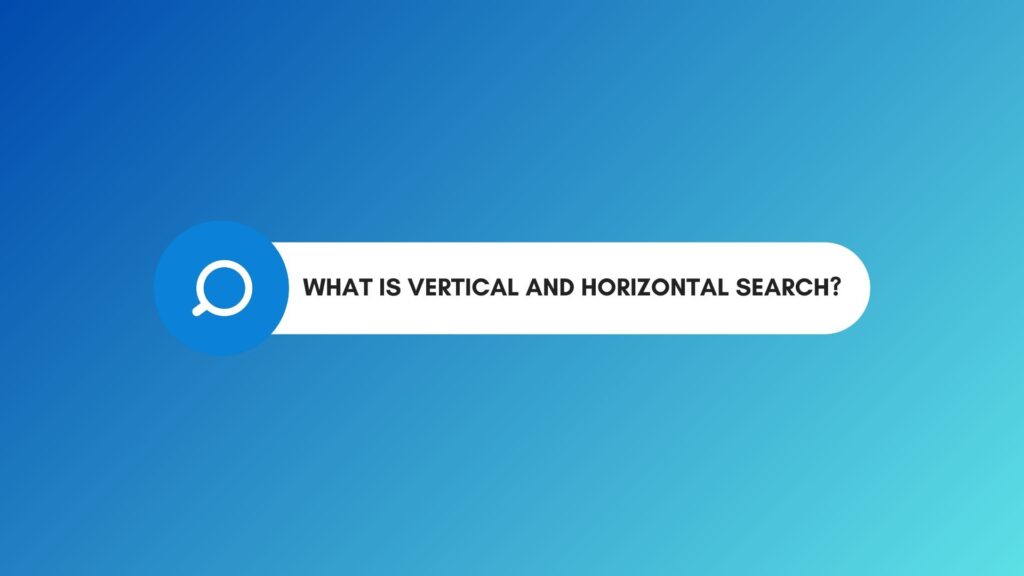What is Vertical and Horizontal Search?

With the evolving digital landscape, understanding the difference between vertical and horizontal searches is crucial for effective SEO implementation. Vertical searches focus on a specific area or type of content on the internet, providing fewer but more targeted results.
On the other hand, horizontal searches cover a wide range of topics and media across the entire internet, yielding a high volume of varied results. Mastering both these search types and knowing how to optimize for each can significantly improve a website’s search ranking and visibility. Let’s explore these two concepts in detail and provide useful tips for optimizing both vertical and horizontal searches.
Understanding Vertical and Horizontal Search
When we talk about Search Engine Marketing (SEM), there are two types of search methods that are crucial to understand: vertical and horizontal search. These methods are not only essential for enhancing your website’s visibility but also for improving your SEO strategy.

What is Vertical Search?
Vertical search refers to a more specialized or niche search that focuses on a specific segment of online content. It filters out the noise from broader searches and provides more targeted results. Here are some key points to understand about Vertical Search:
Industry-Specific Focus
Vertical search engines are designed to cater to specific industries or areas of interest. They filter out all other irrelevant information and only provide results relevant to the specified industry. This can be extremely beneficial for businesses operating in niche markets, as it allows them to reach their target audience more effectively.
Improved User Experience
Users often prefer vertical search engines because they provide a more streamlined and focused search experience. Instead of sifting through pages of irrelevant results, users can find exactly what they’re looking for more quickly. This can lead to higher user satisfaction and more repeat visits.
Quality Over Quantity
While traditional search engines aim to provide the most results, vertical search engines prioritize the quality of the results. This means that users are more likely to find what they’re looking for, and businesses are more likely to connect with potential customers who are genuinely interested in their products or services.

What is Horizontal Search?
Horizontal search, on the other hand, is a broad search method that covers a wide range of topics. It’s the type of search that search engines like Google, Bing, and Yahoo use. Here are some points to understand about horizontal search:
Wide Scope
The most distinguishing feature of horizontal search is its broad scope. It covers multiple categories or sectors, providing users with a wide range of information. This makes it a go-to option for users who are looking for diverse data on a specific topic.
General Results
Unlike vertical search, which provides specialized results, horizontal search yields general results. This means that the results cover a wide array of topics related to the search query.
Multiple Databases
Horizontal search scans multiple databases to provide results. This includes various search engines, online directories, and databases. The use of multiple databases enhances the diversity of the search results.
Unfiltered Results
In most cases, horizontal search provides unfiltered results. This means that the results are not limited to a specific category or sector. However, users can choose to filter the results based on their preferences.
Comparing Vertical and Horizontal Search
While both vertical and horizontal searches have their advantages, it’s essential to understand their differences to maximize your Search Engine Marketing efforts.

Choosing the Right Search Strategy
Selecting the right type of search strategy, whether vertical or horizontal, can significantly influence the success of your online marketing efforts. By understanding the key differences between these two search types, you can tailor your approach to better meet your business goals.
Vertical Search: Precision Targeting
Vertical search is like using a specialized tool designed for a specific job. It can be incredibly effective for businesses that focus on a particular niche. For example, if you sell sporting goods, a vertical search engine that specializes in sports-related products and services will help connect you with customers who are looking specifically for sporting goods. This precision allows for highly targeted marketing campaigns that can lead to better conversion rates and a higher return on investment.
Horizontal Search: Maximizing Exposure
On the other hand, horizontal search works more like a Swiss Army knife, offering a broad range of tools that can be useful in many situations. This type of search is ideal for businesses that aim to reach as wide an audience as possible.
Horizontal search engines like Google provide exposure across all industries, which helps to maximize your visibility. This can be particularly beneficial for businesses that offer products or services that appeal to a broad market or for new businesses looking to establish brand awareness.
Making the Right Choice
Deciding between vertical and horizontal search depends on what you aim to achieve with your marketing strategy. If your goal is to reach a specific audience quickly and with precision, vertical search might be the way to go.
However, if you’re looking to cast a wider net and attract a diverse set of potential customers, horizontal search could be more advantageous. By aligning your search strategy with your business goals, you can more effectively drive traffic and generate sales.
A Holistic Approach to SEO
Understanding the differences between vertical and horizontal searches is vital for enhancing SEO rankings. As the internet continues to grow and change, so too must our understanding and utilization of vertical and horizontal searches. We must embrace a holistic approach to SEO that encompasses both vertical and horizontal searches to stay competitive in today’s increasingly digital world.
